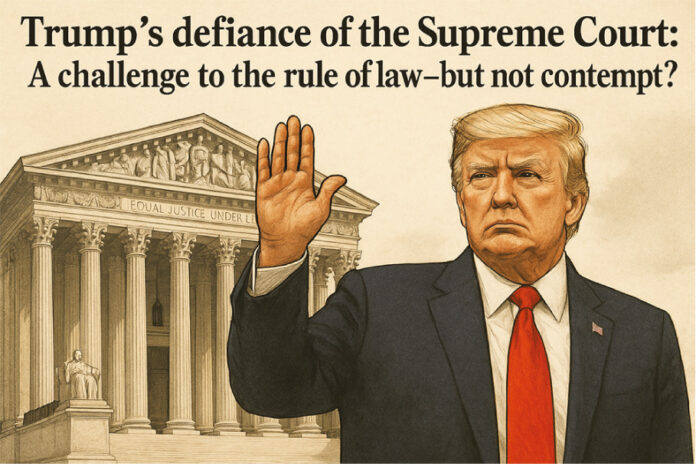by Marvin Ramírez and El Reportero staff
In an unprecedented move that has sparked outrage among legal scholars and civil rights advocates, the Trump administration has openly refused to comply with a U.S. Supreme Court order to facilitate the return of Kilmar Armando Abrego García, a Salvadoran man wrongfully deported from Maryland to El Salvador.
At first glance, this might appear to be a textbook case of contempt of court. A man who was legally residing in the U.S., who had a standing immigration court order protecting him from deportation, was forcibly removed—and now the government refuses to bring him back, even after the Supreme Court stepped in. But the reality is far more complex. And while morally alarming, the legal system’s response may not involve the punishment many are demanding.
The legal and moral crisis
Abrego García’s case is undeniably tragic. According to immigration records and a 2019 ruling by an immigration judge, he was not only eligible to stay in the U.S. but had been granted protection from removal. Nonetheless, he was deported in March 2025, an act the government has since admitted was done in error.
The courts moved swiftly. A federal district judge in Maryland ruled that the deportation was unlawful and ordered the government to bring Abrego García back. The Supreme Court echoed this in a 9–0 decision that instructed the government to “facilitate” his return—though it stopped short of spelling out precisely how that should be done.
What followed was an astonishing rebuke from the executive branch. White House Press Secretary Karoline Leavitt claimed the judiciary had overstepped its authority and that the administration had no obligation to charter planes or negotiate with foreign governments under judicial order. The State Department also cited diplomatic complexities with El Salvador and noted that President Nayib Bukele’s administration had refused to cooperate.
Why contempt of court isn’t so simple
Many are now asking: if a U.S. citizen refused to obey a Supreme Court order, wouldn’t they face contempt charges? So why not President Trump?
The answer lies in the constitutional architecture of the U.S. government.
The Supreme Court, though the highest legal authority in the land, does not have its own enforcement arm. It relies on the Executive Branch—the very body defying it—for implementation. The Marshal of the Supreme Court isn’t going to march into the Oval Office and serve a contempt notice to the President. That’s not how American governance works.
Moreover, the Court’s language was deliberately cautious. By saying the U.S. must “facilitate” the return of Abrego García, the Justices left some interpretive wiggle room. This ambiguity could shield the administration from a technical finding of contempt. The government’s argument is essentially that it has tried to facilitate the return but is blocked by a sovereign foreign nation that refuses to cooperate.
In legal terms, contempt typically requires a willful failure to comply with a clear and specific court order. If the order is ambiguous or compliance is arguably impossible due to third-party actions—such as a refusal from a foreign government—it becomes exceedingly difficult to prove contempt in a court of law.
In short: while the administration’s actions may defy the spirit of the law, it may not be violating the letter of it—at least not in a way the courts are equipped to punish.
A constitutional crisis—without a legal remedy?
This situation isn’t just about Abrego García. It raises deeply uncomfortable questions about the limits of judicial authority and the potential for executive overreach in the modern presidency.
We’ve never seen a president flatly refuse to abide by a Supreme Court directive. Even Richard Nixon, under immense pressure during Watergate, complied with a court order to turn over the White House tapes. But the current refusal to comply, dressed up in legal ambiguity and political defiance, is being framed by the administration as a matter of executive discretion in foreign policy.
That framing is dangerous.
It implies that so long as the President cloaks his actions in the language of diplomacy or national security, he can effectively neuter the Court’s authority. If allowed to stand, this precedent could render judicial oversight irrelevant in future disputes involving immigration, human rights, or executive misconduct.
Political consequences in place of legal ones
Since the Court is unlikely to pursue contempt charges against a sitting president—and since such an effort would almost certainly fail without enforcement powers—the remaining checks must come from Congress and the people.
Already, Democratic lawmakers are mobilizing. Senator Chris Van Hollen has announced plans to travel to El Salvador to pressure President Bukele directly. Others are calling for formal censure or even impeachment proceedings, though the political appetite for such action remains uncertain.
It’s clear that this is not merely a bureaucratic mishap. It is a test of whether the United States still functions under the rule of law—or whether our constitutional safeguards are only as strong as the people in power are willing to honor them.
A Slippery slope
While Trump may not be held in contempt today, the erosion of legal norms is a slow process. If a Supreme Court order can be disregarded by claiming logistical difficulties or diplomatic interference, future presidents will take note. The precedent set here may not lead to immediate collapse, but it contributes to the steady hollowing-out of judicial authority.
And in that vacuum, power accrues elsewhere—to the Executive Branch, to strongman politics, to the idea that might makes right.
That is why this case matters—not only for Kilmar Armando Abrego García, whose life remains in limbo, but for every American who depends on a fair and functioning legal system.
Because in the end, the true danger isn’t that Trump won’t be held in contempt of court.
It’s that he doesn’t have to be.



